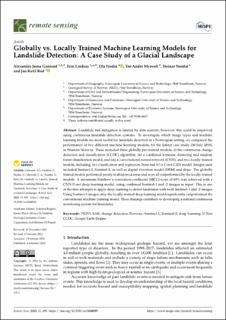| dc.contributor.author | Ganerød, Alexandra Jarna | |
| dc.contributor.author | Lindsay, Erin Rose Pilaar | |
| dc.contributor.author | Fredin, Ola | |
| dc.contributor.author | Myrvoll, Tor Andre | |
| dc.contributor.author | Nordal, Steinar | |
| dc.contributor.author | Rød, Jan Ketil | |
| dc.date.accessioned | 2023-08-15T10:53:25Z | |
| dc.date.available | 2023-08-15T10:53:25Z | |
| dc.date.created | 2023-02-10T11:13:43Z | |
| dc.date.issued | 2023 | |
| dc.identifier.issn | 2072-4292 | |
| dc.identifier.uri | https://hdl.handle.net/11250/3084123 | |
| dc.description.abstract | Landslide risk mitigation is limited by data scarcity; however, this could be improved using continuous landslide detection systems. To investigate which image types and machine learning models are most useful for landslide detection in a Norwegian setting, we compared the performance of five different machine learning models, for the Jølster case study (30 July 2019), in Western Norway. These included three globally pre-trained models; (i) the continuous change detection and classification (CCDC) algorithm, (ii) a combined k-means clustering and random forest classification model, and (iii) a convolutional neural network (CNN), and two locally trained models, including; (iv) classification and regression Trees and (v) a U-net CNN model. Images used included Sentinel-1, Sentinel-2, as well as digital elevation model (DEM) and slope. The globally trained models performed poorly in shadowed areas and were all outperformed by the locally trained models. A maximum Matthew’s correlation coefficient (MCC) score of 89% was achieved with a CNN U-net deep learning model, using combined Sentinel-1 and -2 images as input. This is one of the first attempts to apply deep learning to detect landslides with both Sentinel-1 and -2 images. Using Sentinel-1 images only, the locally-trained deep-learning model significantly outperformed the conventional machine learning model. These findings contribute to developing a national continuous monitoring system for landslides. | en_US |
| dc.language.iso | eng | en_US |
| dc.publisher | MDPI | en_US |
| dc.rights | Navngivelse 4.0 Internasjonal | * |
| dc.rights.uri | http://creativecommons.org/licenses/by/4.0/deed.no | * |
| dc.title | Globally vs. Locally Trained Machine Learning Models for Landslide Detection: A Case Study of a Glacial Landscape | en_US |
| dc.title.alternative | Globally vs. Locally Trained Machine Learning Models for Landslide Detection: A Case Study of a Glacial Landscape | en_US |
| dc.type | Peer reviewed | en_US |
| dc.type | Journal article | en_US |
| dc.description.version | publishedVersion | en_US |
| dc.source.volume | 15 | en_US |
| dc.source.journal | Remote Sensing | en_US |
| dc.source.issue | 4 | en_US |
| dc.identifier.doi | 10.3390/rs15040895 | |
| dc.identifier.cristin | 2124838 | |
| dc.relation.project | Norges forskningsråd: 237859 | en_US |
| cristin.ispublished | true | |
| cristin.fulltext | original | |
| cristin.qualitycode | 1 | |

